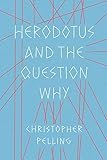Herodotus and the Question Why / Christopher Pelling.
Material type: TextPublisher: Austin : University of Texas Press, [2021]Copyright date: ©2019Description: 1 online resource (360 p.)Content type:
TextPublisher: Austin : University of Texas Press, [2021]Copyright date: ©2019Description: 1 online resource (360 p.)Content type: - 9781477318331
- 938.0072/02 23
- PA4004 .P35 2019
- PA4004 .P35 2019
- online - DeGruyter
| Item type | Current library | Call number | URL | Status | Notes | Barcode | |
|---|---|---|---|---|---|---|---|
 eBook
eBook
|
Biblioteca "Angelicum" Pont. Univ. S.Tommaso d'Aquino Nuvola online | online - DeGruyter (Browse shelf(Opens below)) | Online access | Not for loan (Accesso limitato) | Accesso per gli utenti autorizzati / Access for authorized users | (dgr)9781477318331 |
Browsing Biblioteca "Angelicum" Pont. Univ. S.Tommaso d'Aquino shelves, Shelving location: Nuvola online Close shelf browser (Hides shelf browser)

|

|

|

|

|

|

|
||
| online - DeGruyter ¡Dichos! The Wit and Whimsy of Spanish Sayings / | online - DeGruyter The Film Photonovel : A Cultural History of Forgotten Adaptations / | online - DeGruyter Graphic Memories of the Civil Rights Movement : Reframing History in Comics / | online - DeGruyter Herodotus and the Question Why / | online - DeGruyter Accountability Across Borders : Migrant Rights in North America / | online - DeGruyter The Florentine Codex : An Encyclopedia of the Nahua World in Sixteenth-Century Mexico / | online - DeGruyter Television Rewired : The Rise of the Auteur Series / |
Frontmatter -- Contents -- Abbreviations -- Preface -- Chapter 1 Why did it a ll happen? -- Chapter 2 To blame and to explain: Narrative complications -- Chapter 3 How can you possibly know? -- Chapter 4 Adventures in prose -- Chapter 5 Hippocratic affinities -- Chapter 6 Explanations in combination -- Chapter 7 Early moves -- Chapter 8 Empire -- Chapter 9 Herodotus’ Persian stories -- Chapter 10 The human and the divine -- Chapter 11 Explaining victory -- Chapter 12 Freedom -- Chapter 13 Democracy -- Chapter 14 Individuals and collectives -- Chapter 15 Then and now: Herodotus’ own day -- Chapter 16 Why indeed? -- Notes -- Bibliography -- Passages in Herodotus -- Passages in Other Authors -- General Index
restricted access online access with authorization star
http://purl.org/coar/access_right/c_16ec
In the 5th century BCE, Herodotus wrote the first known Western history to build on the tradition of Homeric storytelling, basing his text on empirical observations and arranging them systematically. Herodotus and the Question Why offers a comprehensive examination of the methods behind the Histories and the challenge of documenting human experiences, from the Persian Wars to cultural traditions. In lively, accessible prose, Christopher Pelling explores such elements as reconstructing the mentalities of storyteller and audience alike; distinctions between the human and the divine; and the evolving concepts of freedom, democracy, and individualism. Pelling traces the similarities between Herodotus's approach to physical phenomena (Why does the Nile flood?) and to landmark events (Why did Xerxes invade Greece? And why did the Greeks win?), delivering a fascinating look at the explanatory process itself. The cultural forces that shaped Herodotus's thinking left a lasting legacy for us, making Herodotus and the Question Why especially relevant as we try to record and narrate the stories of our time and to fully understand them.
Mode of access: Internet via World Wide Web.
In English.
Description based on online resource; title from PDF title page (publisher's Web site, viewed 26. Apr 2022)


